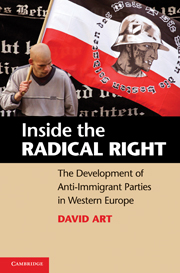Book contents
- Frontmatter
- Contents
- Preface
- Abbreviations
- 1 Introduction
- 2 Activists and Party Development
- 3 Parties of Poor Souls
- 4 Nationalist Subcultures and the Radical Right
- 5 Party Transformation and Flash Parties
- 6 Reforming the Old Right?
- 7 Conclusion
- Appendix A Percentage of the Vote for Radical Right Parties in National Parliamentary Elections
- Appendix B Coding Procedure for Radical Right Party Lists
- Appendix C ISCO Codes for Radical Right Candidates for Office
- Bibliography
- Index
4 - Nationalist Subcultures and the Radical Right
Published online by Cambridge University Press: 05 June 2012
- Frontmatter
- Contents
- Preface
- Abbreviations
- 1 Introduction
- 2 Activists and Party Development
- 3 Parties of Poor Souls
- 4 Nationalist Subcultures and the Radical Right
- 5 Party Transformation and Flash Parties
- 6 Reforming the Old Right?
- 7 Conclusion
- Appendix A Percentage of the Vote for Radical Right Parties in National Parliamentary Elections
- Appendix B Coding Procedure for Radical Right Party Lists
- Appendix C ISCO Codes for Radical Right Candidates for Office
- Bibliography
- Index
Summary
Radical right activists in Flanders, France, and Austria often place their movements in historical perspective. As one Vlaams Belang (VB) activist put it, “We have been fighting for our identity for five generations.” Members of the French National Front consider themselves part of a “two-centuries-old galaxy” of extreme right counterrevolution, Bonapartism, and the integral nationalism of Action Française (Lafont 2006). The Austrian Freedom Party is rooted in a political subculture whose adherence to nationalism, rather than to Catholicism or Socialism, has placed it at odds with the two other major subsocieties (or lager) since the founding of the Austrian Republic.
Yet such historical and ideological continuities on their own cannot explain the electoral success of the VB, FN, and FPÖ. The issues that have traditionally been important for the Flemish, French, and Austrian far right are today irrelevant for the vast majority of these parties' voters. When asked to identify the most important reason for voting for the party, only 4% of the VB's electorate in 1999 cited Flemish nationalism, as opposed to 27% who mentioned immigration (Swyngedouw and Van Craen 2002). Pan-Germanism has long since become a losing issue among the Austrian electorate, and it is highly doubtful that more than a tiny percentage of FN voters have heard of Charles Maurras, the founder of Action Française. More generally, the presence of a significant far right movement at some point in history cannot explain the success of contemporary radical right parties, as the German case illustrates.
- Type
- Chapter
- Information
- Inside the Radical RightThe Development of Anti-Immigrant Parties in Western Europe, pp. 106 - 147Publisher: Cambridge University PressPrint publication year: 2011



